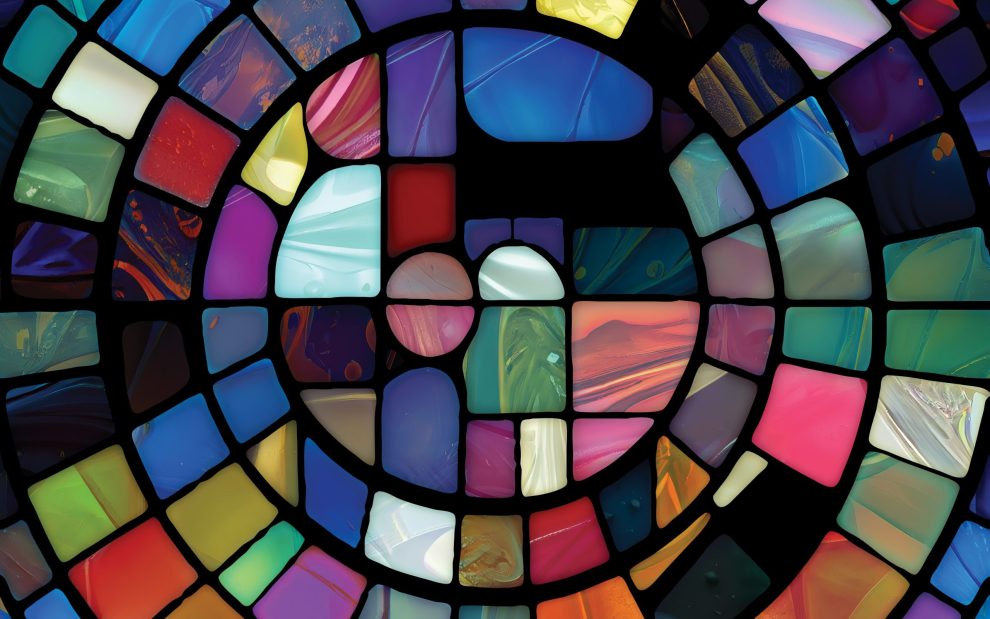“He is the image of the invisible God, the firstborn of all creation; for in him all things in heaven and on earth were created, things visible and invisible.” (Colossians 1:15–16a)
Standing in line for a table at a popular restaurant in San Francisco, I struck up a conversation with a woman nearby. We shared friendly small talk until she mentioned she lived in a wealthy suburb and asked where I was from. Vaguely, I replied, “New Mexico.”
Suddenly there fell between us an awkward pause. We assessed each other silently. What sort of ideology might I expect of her or she of me? We regarded each other’s clothes for clues: coats, handbags, hair, and fingernails. Finally, I offered, “It’s awful, isn’t it? We’re so afraid to trust anyone these days.” She readily agreed, but soon we found reason to turn away and talk to other people.
These days our reality appears fragmented. Nations fight and compete for shrinking resources. Rich and poor are divided by a chasm so immense that their life experiences seem to be happening on separate planets. Race, gender, orientation, religion, and region differentiate us. The temperature of our politics makes us a little scared to talk to one another in any context, from family gatherings to casual conversations with strangers. Because what if the person we’re conversing with is revealed to be—one of them?
Perhaps no society has ever been free of division. But the anxiety in crossing boundaries in our present culture feels new. Some decades back I attended a publicly advertised “Gay Bible Study” in Palm Springs. My intention the same then as it always has been: to learn something, in this case if only to learn what might be gay about Bible study.
During the opening introductions, it became apparent I was the only straight person in the room, so I quickly came clean about that. I was warmly welcomed and forged some friendships I still have. Today, however, I would think twice about crashing through barriers without an explicit invitation.
Barriers appear everywhere, in every neighborhood and context. When my friend Lupe invites me for supper, she makes what she calls “white-people food”: meatloaf and mashed potatoes. I’ve told her I’d be very glad to have the Mexican food she normally eats, but she seems anxious about serving rice and beans to someone who looks like me.
Fear of giving offense, or taking it, has become normative. When in the company of my friend Bob, an observant member of the local synagogue, I used to carefully use the conglomerate phrase “Jewish people” until Bob interrupted me good-humoredly. “We’re Jews, not Jew-ish. You can say Jews and no one will get hurt.”
Two relatives of mine now use gender neutral pronouns to describe themselves, and I respect their identities, even when old habits die hard. Meanwhile in church, we all struggle to find language for God that’s inclusive without being clunky. Still, words matter because they communicate and shape the way we think. They can welcome and they can wound. Learning to speak with respect, honesty, and clarity while seeking to hold everyone together in a genuine community is worth the effort.
These are not new issues, of course. The early church groped to find words and rituals that could bind together two very distinct and mutually suspicious communities: Jews and Gentiles, the latter being the “nations” or non-Jews.
Christianity quickly incorporated both into its assembly, along with enslaved and free citizens. The church absorbed women and men into leadership roles and served the elite and the humble at a common table. While leaders in Jerusalem were initially reluctant to cross some of these barriers, St. Paul was eager to present the gospel and the church with an open-door policy.
By the time the letter to the Colossians was written, which is read on three Sundays this month, Paul’s Christology—that is, his understanding of Jesus as the Messiah-Christ come into the world—had swelled to encompass not just distinct societies but the entire cosmos.
I should mention that the jury’s still out as to whether Paul wrote Colossians himself or handed the themes to be addressed to a scribe and later signed it with his authoritative signature. Colossians might also have been written by a follower of Paul’s after his death.
Since Colossae was destroyed by a massive earthquake between 60 and 64, and Paul was martyred by 64, he may have authorized these ideas from his prison cell before his death, dictating them to a disciple who stamped his own style on it. The letter certainly has many elements and word usages unfamiliar to Paul’s authenticated works, so if Paul had anything to do with its crafting, it’s likely someone else shared the task.
What’s important is not the composer but the evolution of Pauline thought. Paul, or his scribe, decided to include in the letter a popular hymn used at Christian liturgies. This appears in the first chapter (verses 15–20, as well as, perhaps, 12–14). Before any gospel was written or widely circulated, this hymn surpasses the belief of Jesus as Son of God by identifying him as “image of the invisible God.”
This sounds like an upgrade. A full generation or more before John’s gospel will describe the Christ as preexisting the human Jesus from the beginning, the hymn in Colossians calls him the “first-born of all creation” and claims that “all things in heaven and on earth” were created “in him,” “through him,” and “for him.” The hymn claims that Christ Jesus is the beginning—not an ambiguous statement at all. No wonder this passage is often called the Hymn to the Primacy of Christ.
What did it mean for the earliest Christians to claim that Christ embodies “all the fullness of God” as one greater than “things visible and invisible”? All earthly and spiritual authority—here identified as thrones, dominions, rulers, and powers—are subject to Christ. This was a swipe at Roman imperialism for sure. But it also implies that if all are subject to Christ, then all human divisions are meaningless. God is pleased through Christ to “reconcile all things to him” in a vast peace that settles on the cosmos through the blood of the cross. What we imagine as divided and distinct, God views as healed and whole.
This adds greater impact to Pope Francis saying, “Who am I to judge?” Or Rodney King’s plea: “Can we all get along?” Or Paul’s words from Romans: “If God is for us, who is against us?” (8:31b).
If we believe in the Cosmic Christ, the faith of our fathers and mothers sung and avowed around the earliest Eucharists, then a local, personal, and proprietary Jesus just won’t do. Jesus Christ is Lord of all: up and down the economic ladder, across platforms and politics, Lord of all gender distinctions, nations, religions.
Jesus doesn’t care what kind of purse the woman queueing with me at the restaurant was carrying; reconciles Jew and Gentile and more; is present at a table of “white-people food” as well as tables of sushi, falafel, fry bread, and gumbo. Christ Jesus embodies all, or as late-Paul terminology would have it, is “all in all.”
Maybe this appreciation of Jesus is too big for modern tastes so anxious to separate and define. Yet as we recognize the Jubilee of Young Adults and Young People this month (July 28–August 3), we witness to the young who lead the way on uniting across differences. Because a vast peace has settled on the cosmos with the cross. Are we ready to sit at this table?
This article also appears in the July 2025 issue of U.S. Catholic (Vol. 90, No. 7, pages 47-49). Click here to subscribe to the magazine.
Image: Shutterstock













Add comment